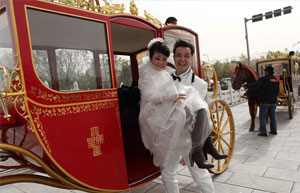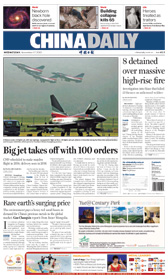Fortified food to improve diets and health now in stores
Updated: 2010-11-22 13:51
By Yu Tianyu (China Daily)
|
 |
|
A Carrefour employee shows a Vitamin-fortified edible oil product to Eric Legros (second from left), president and chief executive officer of the chain store, accompanied by Chinese nutritionists and shoppers at Carrefour's Shuangjing outlet in Beijing's Chaoyang district. [Photo / China Daily] |
BEIJING - Tuna sandwiches, milk bread and fried rice with egg - enthusiastic customers are snapping up these new offerings from chefs and nutritionists at Carrefour's Shuangjing outlet in Beijing's Chaoyang district.
The dishes are made with specially fortified ingredients and aggressively marketed by the retail giant in a bid to improve diets and prevent diseases caused by nutritional deficiencies.
Vital nutrients are added to supplement people's daily intake to meet the minimum daily requirements for humans.
Eric Legros, president and chief executive officer of Carrefour China, said: "Through these activities and promotions at Carrefour stores, we hope more Chinese people will get familiar with the notion of fortified food and enjoy a more balanced nutritional intake."
With the support of the Ministry of Health (MOH) and financed by the United Nations International Children's Fund (UNICEF) and the Global Alliance for Improved Nutrition (GAIN), three major fortified foods, including fortified iron soy, fortified flour, and vitamin A-fortified cooking oil have been promoted nationwide by the Fortified Food Office (FFO) under the Chinese Center for Disease Control and Prevention.
Among fortified food products, NaFeEDTA, which is a highly-absorbed iron, has been added to soy to help improve the health of iron-deficient anemia sufferers. Fortified flour contains micronutrients including iron, zinc, calcium, vitamin B, vitamin B2, niacin acid and folic acid among other essentials.
Chen Junshi, director of FFO, said: "In China, a half of Chinese residents lack iron and one in four is suffering from iron-deficiency anemia."
Every year, more than 20,000 Chinese children die from infections that with a diet of sufficient Vitamin A they could have fought off.
Li Guanglin, division director of the Ministry of Health, said that fortified food is economically sustainable and an easy way to improve the country's overall nutritional balance and health.
Legros said: "Carrefour China started the fortified food promotion campaign in 2006 when the Carrefour (China) Foundation for Food Safety signed an agreement with the FFO to jointly promote iron-fortified soy sauce."
During the campaign, Carrefour China will promote three categories of fortified food in its 163 stores across China.
Carrefour China will maintain dedicated shelves for fortified products.
The company will not charge any FFO-recommended suppliers any entrance fee in a bid to bring more medium- and small-sized Chinese suppliers into the project. Promotion events will be held every three months free of charge to food suppliers.
| ||||
Sun Yukai, marketing director for North China at Qingdao Biomate Foodstuff Co Ltd, a fortified food supplier to Carrefour China, said: "It is very difficult for us to promote fortified food in China because it costs more and most Chinese people are used to putting lower prices as their priority when they purchase food."
However, Legros is optimistic about the future of fortified food in China. He says the company will support measures to keep prices down.
When asked whether there would be problems if people with an already healthy diet ate fortified foods, he said the body was capable of disposing of unnecessary nutrients naturally.
"The deficiency problems are hardly invisible, but at the same time the awareness of fortified food in China is low," Chen said, adding that many people find themselves lacking iron or zinc only when they fall ill.
For example, in Chinese cities, many female white-collar workers lack iron because they are on a constant diet. However, very few realize it.
Chen said fortified food is designed to contain certain nutrients of the minimal level for people's daily needs so there will not be any problems from ingesting an excess.
Herve Gomichon, quality director for Carrefour Group, said: "Retailers are responsibly for promoting scientific concepts for nutrition and helping countries and regions they operate in to improve the health of local people.
"Carrefour will constantly participate in fortified food promotion campaigns and also import good practices in other countries into China, as well as sharing its experience here with other countries."
Paper's Digest

China bags Asiad team tennis title after 24 yrs
Wimbledon semifinalist Li Na led host China to capture the team tennis title on Tuesday at the Asian Games, accomplishing her Asiad tour with three consecutive victories.
China rate rises no panacea to curb inflation: PBOC adviser
Specials

Russian possessed with TCM
Born into a family of doctors, Maxime became interested in Traditional Chinese Medicine (TCM) at the age of 12, after hearing about TCM theories such as health preservation and recuperation.

Acupuncture takes stab at UNESCO list
Acupuncture and Peking Opera have been selected as candidates for UNESCO intangible cultural heritage status.

The wedding coach comes back to life
A groom carries his bride from a wedding coach in Xuchang, Henan province, Nov 11, 2010. Produced a local factory, various original hand-made wedding carriages were displayed on the streets, attracting young people chasing fashion and an environment-friendly lifestyle.




